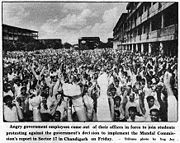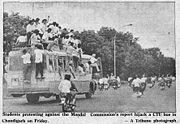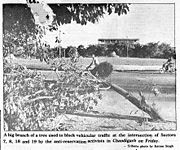
Mandal Commission protests of 1990
Encyclopedia



- see main article Mandal CommissionMandal commissionThe Mandal Commission was established in India in 1979 by the Janata Party government under Prime Minister Morarji Desai with a mandate to "identify the socially or educationally backward." It was headed by Indian parliamentarian Bindheshwari Prasad Mandal to consider the question of seat...
of India
Mandal Commission
Mandal commission
The Mandal Commission was established in India in 1979 by the Janata Party government under Prime Minister Morarji Desai with a mandate to "identify the socially or educationally backward." It was headed by Indian parliamentarian Bindheshwari Prasad Mandal to consider the question of seat...
protests of 1990 were against giving government jobs to certain castes on basis of birth rather than merit of the candidate. These protests closed roads, highways, transportation services, government services, schools, and businesses of India
India
India , officially the Republic of India , is a country in South Asia. It is the seventh-largest country by geographical area, the second-most populous country with over 1.2 billion people, and the most populous democracy in the world...
. Anti-reservationists
Reservation in India
Reservation in India is a form of affirmative action designed to improve the well being of socially backward and underrepresented communities of citizens in India. There are laws in place, wherein a certain percentage of total available slots in Jobs and Education are set aside for people from...
protested. Student protests were planned publicly, and in advance. Protest events were photographed for many published articles of newspapers locally and nationally. Protests began during the year when the eleven-year-old Mandal Commission was opened to bring into effect new government employment opportunities, reservation for backwards classes.
Between the failure to effectively control the political cost of the protests escalating enough to close parts of the nation, and an eleven-year-old human rights improvement project, were causes that ultimately led to accepting the resignation of the Janata Dal
Janata Dal
Janata Dal is an Indian political party which was formed through the merger of Janata Party factions, the Lok Dal, Congress, and the Jan Morcha led by V. P...
party's Prime Minister of India, V. P. Singh. Most likely, the protests were comparable to a globally largest, unified national demonstrations of a labour union strike combined with a version of a race riot.
These protests were widespread and enjoyed support of common people. "There is reason to believe that the students' protests in 1990 would not have been so ferocious if it were not for the covert support extended to them by certain political parties, such as the Congress and the Bharatiya Janata Party."
Culturally unique features of the protests and riots were bandh
Bandh
Bandh , originally a Hindi word meaning 'closed', is a form of protest used by political activists in some countries like India and Nepal. During a Bandh, a political party or a community declares a general strike....
s (a version of a strike), hartal
Hartal
Hartal is a term in many Indian languages for strike action, used often during the Indian Independence Movement. It is mass protest often involving a total shutdown of workplaces, offices, shops, courts of law as a form of civil disobedience...
s (a version of a municipal shut-down), dharna
Dharna
A dharna , is a fast undertaken at the door of an offender, especially a debtor, in India as a means of obtaining compliance with a demand for justice, such as payment of a debt....
s (a version of swarming). Incidents of destruction of public property, looting, and intimidation for bandhs, hartals and dharnas were published and listed geographically as travel information in newspaper articles. Articles also highlighted politicians and victims of rioting during the protests. Although not advisable, late summer travel by airline and vehicle during the protests was possible without delays, between capitals New Delhi and Chandigarh, and Shimla for example. Police prevented extending the range and duration of the strikes, and some strike activity from even occurring. A national state of emergency was largely not declared to mobilize army units against any one demonstration.
Rajiv Goswami
Rajiv Goswami was the first student to attempt self-immolation while a student at Delhi University in 1990 to protest against Prime Minister V.P. Singh's implementation of the Mandal Commission laws for Affirmative Action (reservation) recommendations. His action sparked a series of self-immolations by college students and led to a formidable movement against job reservations for backward castes, as recommended by the Mandal Commission.Surinder Singh Chauhan
Surinder Singh Chauhan was the first student to perform self-immolation while an evening student of Deshbandhu College (Delhi University) on September 24, 1990 to protest against implementation of the Mandal Commission recommendation for reservation to candidates based on birth.He left a suicide note stating that "The responsibility for my death lies with those people who consider reservation a vote bank, people like V.P. Paswan, Yadav ...".

